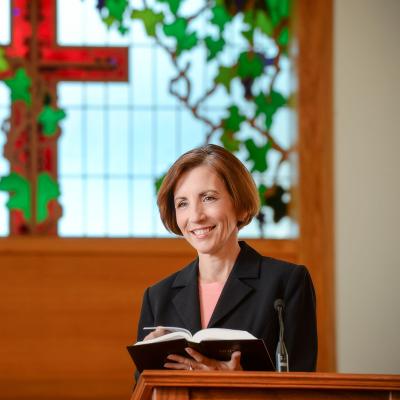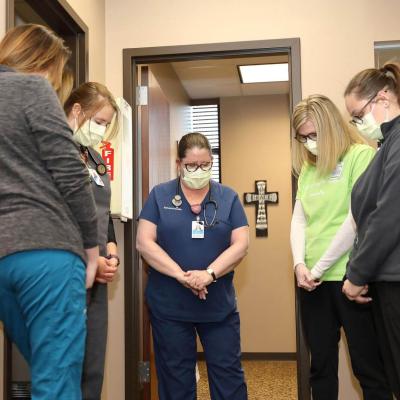- AdventHealth University

Updated July 28. 2025.
College is a time of significant and meaningful change for many students. Whether they are living away from home for the first time or being exposed to perspective-changing ideas, students may question their faith or become more interested in religion and spirituality. They may explore a new faith or simply need counsel on the changes they are experiencing. A university chaplain offers students, as well as faculty and staff, spiritual support and guides them toward further help they may need.
Duties of a University Chaplain
Every student’s experience is different. Some deal with social stressors, others have strenuous family relationships, and still others struggle with heavy course loads. University chaplains are available to counsel and comfort students through all these situations.
Furthermore, chaplains offer support to faculty and staff members who require spiritual or emotional guidance. University chaplains also raise awareness among faculty and staff about resources that can help students. They help the university community at large understand, appreciate, and respect the diverse faiths students may practice, encouraging an awareness of all religions, known as religious literacy.
Chaplains serve the entire university community, helping individuals from all faiths navigate adversity and respect one another’s traditions. Below are just a few examples of a university chaplain’s responsibilities.
Facilitate Religious and Spiritual Practices
From Catholic to Buddhist, university chaplains help facilitate and celebrate religious services and rituals of all faiths. Students looking for a religious community can explore options with their specific university chaplain. A chaplain facilitates these spaces and provides opportunities for members of the university community to grow in their chosen religion and celebrate it with others. For example, chaplains may offer worship services for holidays as diverse as Yom Kippur, Diwali and Easter.
Although they may belong to a specific religion or denomination, university chaplains are a valuable resource for people of all faiths and backgrounds. The role is well-suited for them, as chaplains typically study world religions as part of their master’s degree programs. Given that chaplains serve the entire diverse campus population, their religious literacy and spirit of inclusion is welcomed by students, staff and faculty alike.
Counsel and Mentor
A university chaplain serves as a valuable resource for individuals on campus who seek guidance. Whether an individual wants to deepen their faith, finds themselves at a crossroads, or wants to begin exploring their spirituality and worldview, a chaplain can provide guidance and support through various life changes.
A university chaplain’s training also includes mentoring members of the campus community on general matters of faith, as well as specific times of hardship and distress. A chaplain can help a student struggling with the transition from living at home to living on campus and suffering from homesickness and insomnia, or counsel a student who has a loved one back home who became ill or suddenly passed away. Likewise, if a faculty member is struggling with finding meaning in teaching or if a grieving staff member has lost a family member, the university chaplain can offer faith-based support and a hopeful outlook.
University students, staff or faculty meet with university chaplains for counseling in an emotional crisis. This counseling can also direct them to additional resources, such as a support group, a psychologist or another professional. In general, a school chaplain’s mission is to address any spiritual, religious or emotional concerns the university community may have and, if needed, help people find additional assistance.
Help Develop Policy and Curriculum
Aside from being a student resource, a university chaplain supports the whole academic institution. They participate in equity committees, with the goal of creating a safe and welcoming campus for everyone, whatever their religious background.
Another way chaplains assist their universities is by collaborating on developing theology courses and religious education programs. They can collaborate directly with a professor to create a curriculum or work with a spiritual care team to develop programs.
Serve Their Unique Demographic
Many institutions employ chaplains, from hospitals to military bases to airports. A university chaplain addresses concerns unique to students and their stressors as they navigate this season of life, often separated from family members and their established religious communities for the first time.
In this way, a university chaplain has a remarkable opportunity to help individuals through especially challenging and inspiring times in their lives, pointing out avenues for them to grow, receive support and graduate spiritually enriched.
A university chaplain is also in the unique position to support those who support students — the faculty and staff. A chaplain can guide a university instructor, whether an assistant professor at the beginning of their career or a tenured department chair, to be a more sensitive mentor to students who may be troubled or searching for meaning. Likewise, chaplains help staff members navigate challenges and guide them to better understand their own faith journey.
Skills of a University Chaplain
A university chaplain’s complex role calls for a specific skill set:
- Interpersonal: Being able to listen carefully and advise students and others clearly about their worries, fears, faith-based issues and responses to grief and other crises.
- Spiritual: Understanding different spiritual perspectives and religious traditions is key to providing effective care.
- Emotional: Understanding and responding with empathy to the emotions students and others experience, offering support and encouragement.
- Analytical: Interpreting signs of crisis and knowing how and when to intervene are crucial skills for university chaplains.
Job Outlook and Salary
According to the U.S. Bureau of Labor Statistics (BLS), clergy members in colleges, universities, and professional schools have an average annual salary of about $71,000. Additionally, this field is experiencing growth. The field is projected to grow by 3% from 2023 through 2033.
Pursue a Meaningful Career Helping Students
The first step in starting a career as a university chaplain is education. AdventHealth University’s Master of Science in Spiritual Care Online degree program prepares students to provide spiritual guidance to those in need through courses such as "Audacity to Trust: Faith and Health" and "Wrestling with God in Suffering."
You can request information about our program, and a member of our team will reach out to you to answer any questions and help you get started today.


